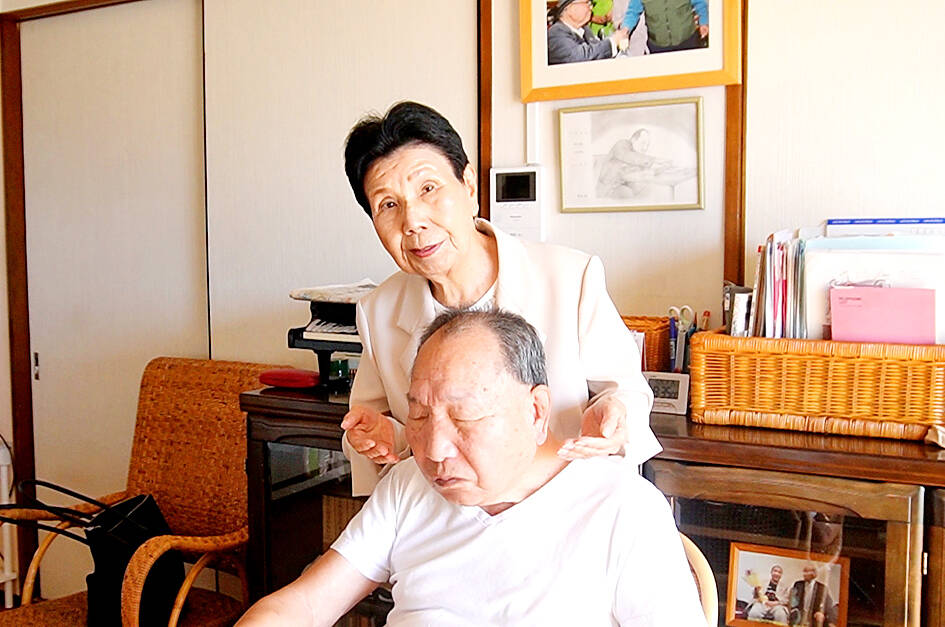A Japanese man who spent almost half a century on death row has been found not guilty of multiple murders, in a closely watched trial that has raised questions about Japan’s use of the death penalty.
Iwao Hakamada, 88, was sentenced to hang in 1968 after being found guilty of murdering his boss, his wife and their two teenage children, and setting fire to their home two years earlier.
The former professional boxer spent 46 years on death row — believed to be the longest time spent on death row of any prisoner worldwide — until he was freed in 2014 when new evidence emerged and a retrial was ordered.

Photo: EPA-EFE
Hakamada has consistently protested his innocence and said investigators forced him to confess, while his lawyers alleged police had fabricated evidence.
There was no immediate decision on whether prosecutors would appeal against the verdict, which was reported by Kyodo news agency and other Japanese media outlets. Hakamada’s defense lawyers have urged prosecutors not to challenge the ruling, given his age.
The presiding judge at Shizuoka District Court, Koshi Kunii, acknowledged that three pieces of evidence had been fabricated, including Hakamada’s “confession” and items of clothing that prosecutors claimed he had been wearing at the time of the murders.
His 91-year-old sister, Hideko Hakamada, who has campaigned tirelessly on behalf of her brother, told reporters before yesterday’s verdict: “For so long we have fought a battle that has felt endless. But this time, I believe it will be settled.”
Prosecutors had again demanded the death penalty, but legal experts had suggested Iwao Hakamada would be acquitted, pointing to four other retrials involving death row inmates in Japan who had their convictions overturned.
Iwao Hakamada, whose physical and mental health deteriorated during his long incarceration, was not present at yesterday’s ruling and has been represented by his sister during the retrial.
The outcome rested on the reliability of bloodstained clothes that prosecutors said Iwao Hakamada had been wearing at the time of the murder, at a miso factory in central Japan where he was a live-in employee.
When it ordered a retrial in March last year after years of legal wrangling, the Tokyo High Court said there was a strong possibility that the clothing had been planted in a tank of miso by investigators.
Defense lawyers said DNA tests on the clothes proved the blood was not Iwao Hakamada’s.
The high court had initially decided not to reopen Iwao Hakamada’s case — a cause celebre for opponents of capital punishment — but reversed its decision after the Japanese Supreme Court ordered it to reconsider in 2020.
Hundreds of people had lined up outside the district court yesterday in the hope of securing a seat in the public gallery, while supporters held up banners demanding Iwao Hakamada’s acquittal.
Campaigners said his ordeal had exposed flaws in Japan’s criminal justice system and the cruelty of capital punishment.
Death row inmates in Japan — one of only two G7 countries along with the US that retains the death penalty — are notified of their execution, by hanging, only hours in advance and given no opportunity to speak to their lawyers or families. Their final conversation is usually with a Buddhist priest.

MAKING WAVES: China’s maritime militia could become a nontraditional threat in war, clogging up shipping lanes to prevent US or Japanese intervention, a report said About 1,900 Chinese ships flying flags of convenience and fishing vessels that participated in China’s military exercises around Taiwan last month and in January have been listed for monitoring, Coast Guard Administration (CGA) Deputy Director-General Hsieh Ching-chin (謝慶欽) said yesterday. Following amendments to the Commercial Port Act (商港法) and the Law of Ships (船舶法) last month, the CGA can designate possible berthing areas or deny ports of call for vessels suspected of loitering around areas where undersea cables can be accessed, Oceans Affairs Council Minister Kuan Bi-ling (管碧玲) said. The list of suspected ships, originally 300, had risen to about 1,900 as

Japan’s strategic alliance with the US would collapse if Tokyo were to turn away from a conflict in Taiwan, Japanese Prime Minister Sanae Takaichi said yesterday, but distanced herself from previous comments that suggested a possible military response in such an event. Takaichi expressed her latest views on a nationally broadcast TV program late on Monday, where an opposition party leader criticized her for igniting tensions with China with the earlier remarks. Ties between Japan and China have sunk to the worst level in years after Takaichi said in November that a hypothetical Chinese attack on Taiwan could bring about a Japanese

Right-wing political scientist Laura Fernandez on Sunday won Costa Rica’s presidential election by a landslide, after promising to crack down on rising violence linked to the cocaine trade. Fernandez’s nearest rival, economist Alvaro Ramos, conceded defeat as results showed the ruling party far exceeding the threshold of 40 percent needed to avoid a runoff. With 94 percent of polling stations counted, the political heir of outgoing Costa Rican President Rodrigo Chaves had captured 48.3 percent of the vote compared with Ramos’ 33.4 percent, the Supreme Electoral Tribunal said. As soon as the first results were announced, members of Fernandez’s Sovereign People’s Party

MORE RESPONSIBILITY: Draftees would be expected to fight alongside professional soldiers, likely requiring the transformation of some training brigades into combat units The armed forces are to start incorporating new conscripts into combined arms brigades this year to enhance combat readiness, the Executive Yuan’s latest policy report said. The new policy would affect Taiwanese men entering the military for their compulsory service, which was extended to one year under reforms by then-president Tsai Ing-wen (蔡英文) in 2022. The conscripts would be trained to operate machine guns, uncrewed aerial vehicles, anti-tank guided missile launchers and Stinger air defense systems, the report said, adding that the basic training would be lengthened to eight weeks. After basic training, conscripts would be sorted into infantry battalions that would take